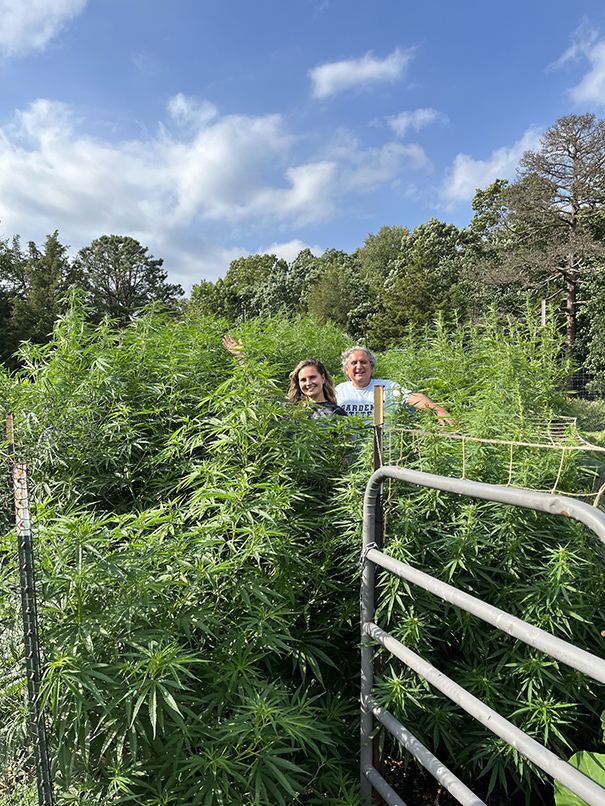Fall 2023 Issue

AI photo generated using Adobe Firefly.
The cannabis industry is booming in New Jersey since the legalization of recreational cannabis last spring. The state currently has 38 dispensaries and has issued 1,700 licenses – some of which are conditional. The employment rates in the field have doubled over the past year from 3,400 to roughly 7,000 and will continue to grow as new licenses reach final approval (Cannabis Legalization | New Jersey League of Municipalities, n.d.).
“If you look at states like Michigan and Massachusetts who are ahead of us in legalization, each have close to about 30,000 jobs. Given the population and our location, we can expect to get up into the mid to high 20,000s in about 3-4 years,” explained Cannabis Studies Teaching Specialist Rob Mejia

“…the ancillary market is actually bigger than the traditional cannabis market. There are different kinds of jobs that support all businesses – accountants, designers, bookkeepers, lawyers, security camera installation, – all those things go into cannabis businesses and that's why the jobs are so numerous.”
In addition to these ancillary jobs, there will be opportunities for niche fields to flourish, especially within hospitality and tourism. As with other states with legalized cannabis, we can anticipate seeing the opening of consumption lounges, specialized chefs and restaurants catering infused meals, wellness and studio events paired with cannabis, and even cannabis-friendly weddings and lodging, to name a few.
As with all new growth, comes some challenges – some that you wouldn’t typically think of. With 70% of townships opting out of cannabis cultivation and sales, real estate options are limited for cannabis businesses, which prevents conditional licenses from becoming permanent. Other municipalities that have opted in are also dealing with some pushback from their residents as they try to navigate business requests to grow outdoors.
Mejia noted that the cannabis industry is still fighting stigma. He explains, “I think there's a lot of towns that are doing the sit-and-wait approach. They want to see what's happening to the neighboring townships – if there is going to be smell, crime, or other things they can't even anticipate…as they see that those are mostly nonissues, I think we'll see more townships opt in, which would be good.”
Students Get First Hand Look at Local Concerns
In 2021, Galloway’s council voted to permit marijuana business within the township, except for retail. With this new development, township residents had some concerns that were addressed at last March’s town council meeting. A group of students from the Cannabis Minor attended the meeting with Mejia to listen to the township resolution regarding marijuana cultivation.

“Some people worried about the health effects of the smell, of which there are no negative health effects. It's like a pine forest has a smell called pinene [Pinene is a collection of unsaturated bicyclic monoterpenes. Two geometric isomers of pinene are found in nature, α-pinene and β-pinene. Both are chiral. As the name suggests, pinenes are found in pines.]; It's a terpene [Terpenes are aromatic compounds found in many plants which create the characteristic scent of many plants, such as cannabis, pine, and lavender, as well as fresh orange peel. In nature, terpenes protect the plants from animal grazing or infectious germs.] It’s the same exact terpene that's in cannabis. When you walk through the forest and you smell that pine smell, that exists in a lot of cannabis strains,” explained Mejia. “From the time it starts to bloom through the harvest, so you might have a total of the maximum six weeks where you can get the smell and most intense for about three to four weeks.”
As a result of the debate at the meeting, the Council would not commit to an outdoor farm at this time; however, an indoor grow site for Grasshopper Farms was approved and is moving forward. Although the outcome wasn’t what most wanted, it was an excellent learning experience for the cannabis minor students. Mejia explained how this opened the door for the students to conduct research in this area and hopefully set a standard for municipalities to go by. “We're talking about doing a research project where we're going to put sensors indoors, outdoors near a mint farm in Vineland and in the forest, as well as at Grasshoppers Farm’s outdoor farm in Michigan. We can gather some data and see exactly when things smell,” he said.
They’re hoping data collected from the study will be helpful to other municipalities that have similar concerns. “The big thing is how far downwind will it go. We’re hoping to find out how far cannabis smell will travel so townships know how far away outdoor farms should be located from residences, schools, and other public areas,” explained Mejia.
With sales from recreational cannabis exceeding $328 million ($20 million collected in tax revenue from April – December 2022), the cannabis industry will continue to boost the economy in New Jersey and growth in employment.
Medicinal Cannabis program. (n.d.). https://www.nj.gov/cannabis/medicinalcannabis/
Cannabis Legalization | New Jersey League of Municipalities. (n.d.-b). https://www.njlm.org/969/Cannabis-Legalization#:~:text=Governor%20Murphy%20signed%20the%20New,19
Leaving footprints: Can growing indoor cannabis be sustainable? (2023, April 11). KCRW. https://www.kcrw.com/news/shows/greater-la/cannabis-cd-6-10-oc/indoor-grows-weed-sustainability#:~:text=But%20indoor%20cultivation%20has%20one,commodity%20crops%2C%20like%20wine%20grapes
Erickson, B. E. (2023b). Cannabis industry inches toward sustainability. Chemical & Engineering News. https://cen.acs.org/environment/Cannabis-industry-inches-toward-sustainability/100/i30
Johnson, J. (2020). What to know about terpenes. www.medicalnewstoday.com. https://www.medicalnewstoday.com/articles/what-are-terpenes



